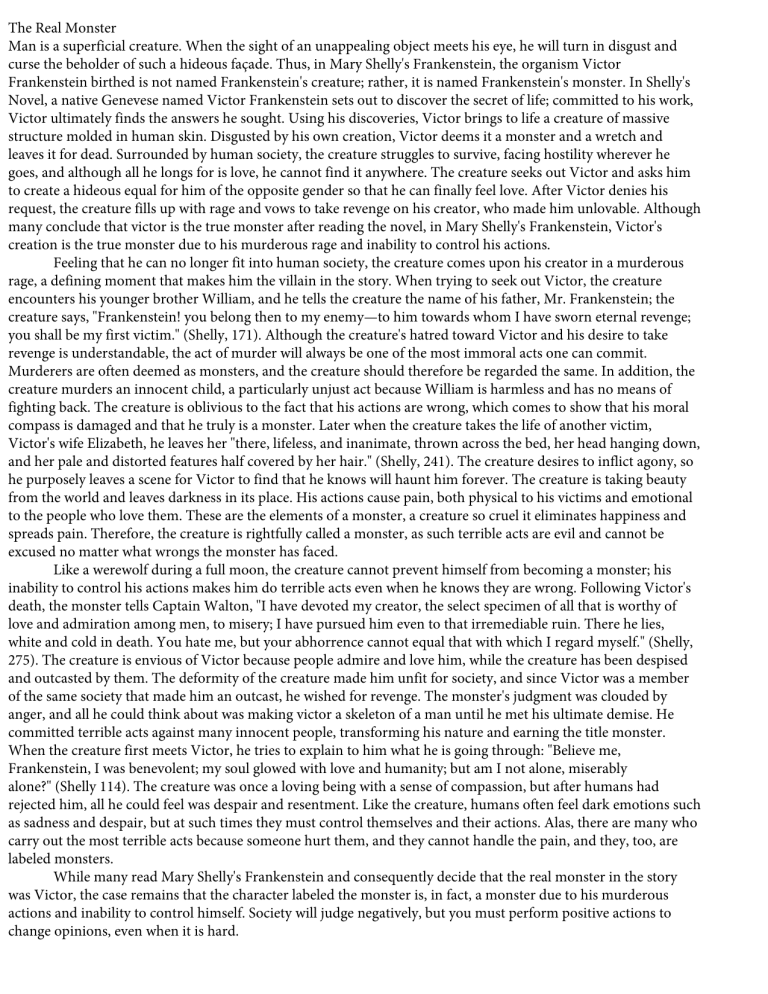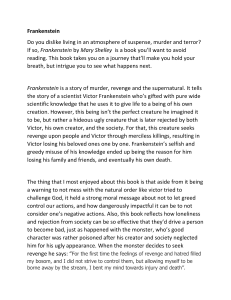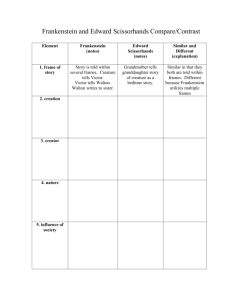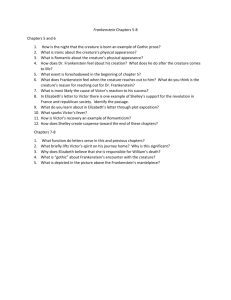
The Real Monster Man is a superficial creature. When the sight of an unappealing object meets his eye, he will turn in disgust and curse the beholder of such a hideous façade. Thus, in Mary Shelly's Frankenstein, the organism Victor Frankenstein birthed is not named Frankenstein's creature; rather, it is named Frankenstein's monster. In Shelly's Novel, a native Genevese named Victor Frankenstein sets out to discover the secret of life; committed to his work, Victor ultimately finds the answers he sought. Using his discoveries, Victor brings to life a creature of massive structure molded in human skin. Disgusted by his own creation, Victor deems it a monster and a wretch and leaves it for dead. Surrounded by human society, the creature struggles to survive, facing hostility wherever he goes, and although all he longs for is love, he cannot find it anywhere. The creature seeks out Victor and asks him to create a hideous equal for him of the opposite gender so that he can finally feel love. After Victor denies his request, the creature fills up with rage and vows to take revenge on his creator, who made him unlovable. Although many conclude that victor is the true monster after reading the novel, in Mary Shelly's Frankenstein, Victor's creation is the true monster due to his murderous rage and inability to control his actions. Feeling that he can no longer fit into human society, the creature comes upon his creator in a murderous rage, a defining moment that makes him the villain in the story. When trying to seek out Victor, the creature encounters his younger brother William, and he tells the creature the name of his father, Mr. Frankenstein; the creature says, "Frankenstein! you belong then to my enemy—to him towards whom I have sworn eternal revenge; you shall be my first victim." (Shelly, 171). Although the creature's hatred toward Victor and his desire to take revenge is understandable, the act of murder will always be one of the most immoral acts one can commit. Murderers are often deemed as monsters, and the creature should therefore be regarded the same. In addition, the creature murders an innocent child, a particularly unjust act because William is harmless and has no means of fighting back. The creature is oblivious to the fact that his actions are wrong, which comes to show that his moral compass is damaged and that he truly is a monster. Later when the creature takes the life of another victim, Victor's wife Elizabeth, he leaves her "there, lifeless, and inanimate, thrown across the bed, her head hanging down, and her pale and distorted features half covered by her hair." (Shelly, 241). The creature desires to inflict agony, so he purposely leaves a scene for Victor to find that he knows will haunt him forever. The creature is taking beauty from the world and leaves darkness in its place. His actions cause pain, both physical to his victims and emotional to the people who love them. These are the elements of a monster, a creature so cruel it eliminates happiness and spreads pain. Therefore, the creature is rightfully called a monster, as such terrible acts are evil and cannot be excused no matter what wrongs the monster has faced. Like a werewolf during a full moon, the creature cannot prevent himself from becoming a monster; his inability to control his actions makes him do terrible acts even when he knows they are wrong. Following Victor's death, the monster tells Captain Walton, "I have devoted my creator, the select specimen of all that is worthy of love and admiration among men, to misery; I have pursued him even to that irremediable ruin. There he lies, white and cold in death. You hate me, but your abhorrence cannot equal that with which I regard myself." (Shelly, 275). The creature is envious of Victor because people admire and love him, while the creature has been despised and outcasted by them. The deformity of the creature made him unfit for society, and since Victor was a member of the same society that made him an outcast, he wished for revenge. The monster's judgment was clouded by anger, and all he could think about was making victor a skeleton of a man until he met his ultimate demise. He committed terrible acts against many innocent people, transforming his nature and earning the title monster. When the creature first meets Victor, he tries to explain to him what he is going through: "Believe me, Frankenstein, I was benevolent; my soul glowed with love and humanity; but am I not alone, miserably alone?" (Shelly 114). The creature was once a loving being with a sense of compassion, but after humans had rejected him, all he could feel was despair and resentment. Like the creature, humans often feel dark emotions such as sadness and despair, but at such times they must control themselves and their actions. Alas, there are many who carry out the most terrible acts because someone hurt them, and they cannot handle the pain, and they, too, are labeled monsters. While many read Mary Shelly's Frankenstein and consequently decide that the real monster in the story was Victor, the case remains that the character labeled the monster is, in fact, a monster due to his murderous actions and inability to control himself. Society will judge negatively, but you must perform positive actions to change opinions, even when it is hard.



